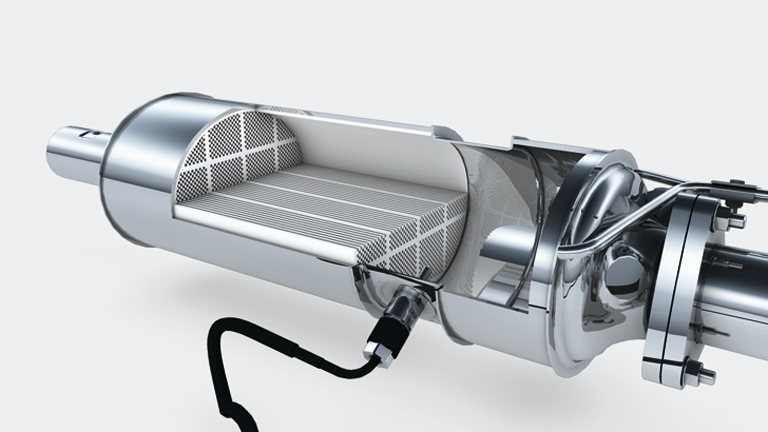
Diesel Particulate Filters (DPFs) are causing a lot of frustration to both consumers and the auto industry at the moment. This is because DPF’s are costly to replace, deemed illegal to remove (yet are easy to do so), aftermarket DPFs don’t work as they should and when all the figures are in, diesel particulate filters don’t actually appear to help emissions or the environment (the pro’s and con’s cancel each other out) which is what they are designed to achieve.
What is a Diesel Particulate Filter? A DPF (also known as FAPs) are an additional filter fitted to the exhaust system of a diesel vehicle and is designed to filter out (catch to you and me) unburnt soot particles from exiting the exhaust into the environment. Putting it bluntly then, a DPF is designed to clog up.
Since 2009 as part of the requirement to meet Euro5 emission standards, all diesel vehicles produced have a Diesel Particulate Filter fitted as standard. Although some vehicles produced as early as 2006 have had DPFs fitted at the factory if those vehicles didn’t meet the previous Euro3 and Euro4 emission standards.
So oversimplifying the above, a DPF is designed to stop black smoke coming out of the exhaust system of a diesel vehicle and, by stopping such an unpleasant sight, be better for the environment. Why do we have such a cynical point of view? Our cynicism is based on the fact that if DPFs were truly effective and beneficial for the environment then removing them would cause, without question, a vehicle to fail its emission test and yet this isn't unequivocally so. And we secretly believe the governing bodies know this and that is why legislation introduced in Feb 2014 is worded very carefully to say; “changing any part of the exhaust or emissions system with a part other than the vehicle manufacturer’s original part that may change the emissions could be an offence”. Note, it does not say ‘is’ an offence but ‘could be’. In other words, if a diesel particulate filter was truly effective in reducing emissions (rather than causing frustration to the industry and vehicle owners alike) the legislative wording regarding the removal of a DPF would be much tighter. There are two quick points to be made regarding this:
As part of the legislation introduced in 2014, MOT tests now include a visual inspection of the exhaust system. If during the visual inspection the DPF is not present where it was otherwise fitted as standard equipment, your vehicle will be deemed to no longer comply with emission standards (even if it did comply!) and will automatically fail its MOT. In short then, to pass a MOT your vehicle must have its diesel particulate filter fitted.
In our next blog, we’ll look at why despite being a great idea, we feel DPF’s are flawed in their execution when it comes to being beneficial to the environment as well as why they’re a pain in the backside to vehicle owners.
What is a Diesel Particulate Filter? A DPF (also known as FAPs) are an additional filter fitted to the exhaust system of a diesel vehicle and is designed to filter out (catch to you and me) unburnt soot particles from exiting the exhaust into the environment. Putting it bluntly then, a DPF is designed to clog up.
Since 2009 as part of the requirement to meet Euro5 emission standards, all diesel vehicles produced have a Diesel Particulate Filter fitted as standard. Although some vehicles produced as early as 2006 have had DPFs fitted at the factory if those vehicles didn’t meet the previous Euro3 and Euro4 emission standards.
So oversimplifying the above, a DPF is designed to stop black smoke coming out of the exhaust system of a diesel vehicle and, by stopping such an unpleasant sight, be better for the environment. Why do we have such a cynical point of view? Our cynicism is based on the fact that if DPFs were truly effective and beneficial for the environment then removing them would cause, without question, a vehicle to fail its emission test and yet this isn't unequivocally so. And we secretly believe the governing bodies know this and that is why legislation introduced in Feb 2014 is worded very carefully to say; “changing any part of the exhaust or emissions system with a part other than the vehicle manufacturer’s original part that may change the emissions could be an offence”. Note, it does not say ‘is’ an offence but ‘could be’. In other words, if a diesel particulate filter was truly effective in reducing emissions (rather than causing frustration to the industry and vehicle owners alike) the legislative wording regarding the removal of a DPF would be much tighter. There are two quick points to be made regarding this:
- Because of the above legislation it is true to say that it is not illegal to remove a DPF from a vehicle. It is however, illegal to drive your vehicle on UK public roads if it does not meet the emissions standards it was designed to meet.
- If you have an aftermarket diesel particulate filter fitted (not an OEM part) and it is not as effective as the original DPF specified by the manufacturer, then based on the wording above, you could still be illegally driving your vehicle on the road!
As part of the legislation introduced in 2014, MOT tests now include a visual inspection of the exhaust system. If during the visual inspection the DPF is not present where it was otherwise fitted as standard equipment, your vehicle will be deemed to no longer comply with emission standards (even if it did comply!) and will automatically fail its MOT. In short then, to pass a MOT your vehicle must have its diesel particulate filter fitted.
In our next blog, we’ll look at why despite being a great idea, we feel DPF’s are flawed in their execution when it comes to being beneficial to the environment as well as why they’re a pain in the backside to vehicle owners.

 RSS Feed
RSS Feed